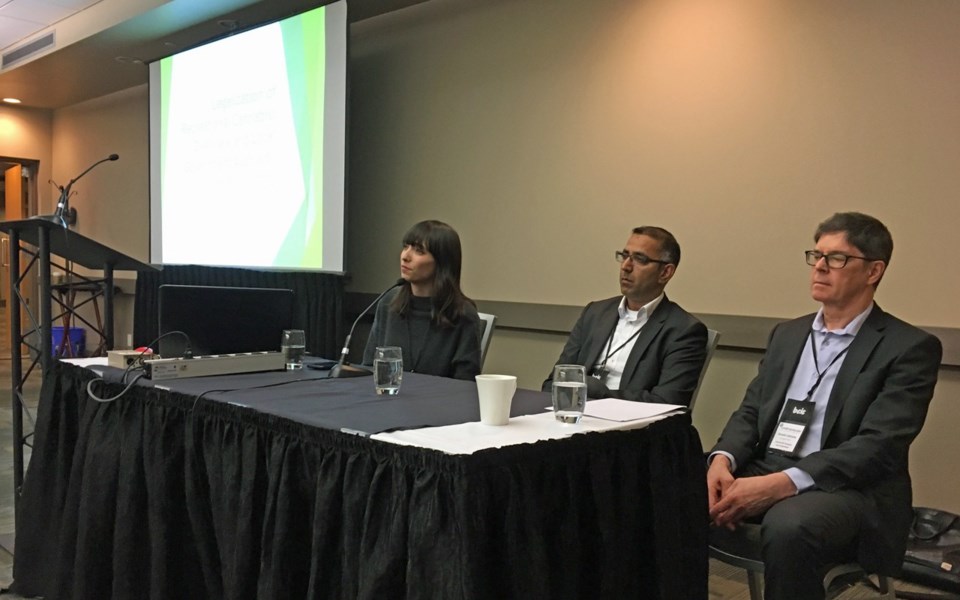While the federal government pushes ahead with its plan to legalize recreational cannabis this summer, municipalities are still mostly in the dark about the specifics.
"Unfortunately, even today, we don't know what flesh is going to be put on the bones," said lawyer Sukhbir Manhas in a panel discussion at the Lower Mainland Local Government Association conference on May 9.
"The (federal) Cannabis Act sets out a general framework for how legalization is going to work, but there is a lot to be said and a lot to be done in terms of the regulatory framework along that, and that's all going to be brought in by the federal government through regulations."
The approach Whistler has taken to this point—passing a bylaw to restrict cannabis retail, production and distribution in the absence of more specifics—is sound, Manhas said.
"That gives you the greatest degree of control in respect of where these operations may come into play in your local government," he said, adding that other approaches municipalities are taking include specific distance requirements (no two dispensaries within 500 metres, for example) or outright prohibition.
There's also a very real concern that municipalities will be shouldering all of the financial burden, making the need for sufficient tax revenue all the more important, said lawyer Don Lidstone.
"My main issue is that all of a sudden here we have another substantial new issue that governments are obligated to pay for and provide for, with very little time to prepare, and with very little guidance from other orders of government, to get staffing and get programs, get policies, get bylaws, figure out what the rules of the game are, and to most of all, get the revenue and the financial capacity to deal with another huge user service or activity that local governments are suddenly obligated to regulate and prohibit and enforce," Lidstone said.
"As far as I'm concerned, municipalities should be getting a major share of the tax revenue from this new regime in order to pay for the impacts that we're facing at the local level."
Though many municipalities have asked for 50 per cent of total cannabis tax revenue, no firm details have been revealed from the provincial government at this point.
Further to the financial concerns, Lidstone said he has three municipal clients right now that are looking at running their own dispensaries and reaping the benefits.
"So they'd have the only one in town and be able to control it, and they would get a fair amount of revenue from that," he said. "There are a lot of ramifications of that ... but it's doable—a lot of municipalities get into various businesses like economic development and swimming pools and recreational facilities that they make money on, and so why not a dispensary?"
Whistler Councillors Cathy Jewett, John Grills, Jen Ford, Sue Maxwell and Jack Crompton were all in attendance for the session.
"The position that Whistler took of just putting a blanket over the community ... it helps us then deciding how we can manage the zoning and locations and the licensing," Grills said. "Hopefully the province will finish and get us the rest of the information as soon as possible, so that we can get on with our work."
And the prospect of Whistler going into the cannabis business for itself remains an alluring one, Ford said.
"I think it's worth looking at for sure," she said. "Housing costs and building housing and all of that, you've got to find the money somewhere, and we don't want to continue to put it on the end user and the taxpayer."
Cannabis activist Jodie Emery was also on the panel, and spoke of a wide range of issues, including the positive impact of cannabis in relation to opioid deaths and the need to embrace B.C.'s reputation for growing great cannabis.
"Legalization should mean job creation, tax revenue and all the rest. It doesn't mean more government, more bureaucracy, more spending trying to suppress something that we're supposed to be legalizing," Emery said.
"Be cannabis and pot friendly, and I promise it will pay off in tourism—as we already experience in B.C.—and even more business and tax revenue, job creation, rather than trying to stamp it out, which has never worked and still won't."




